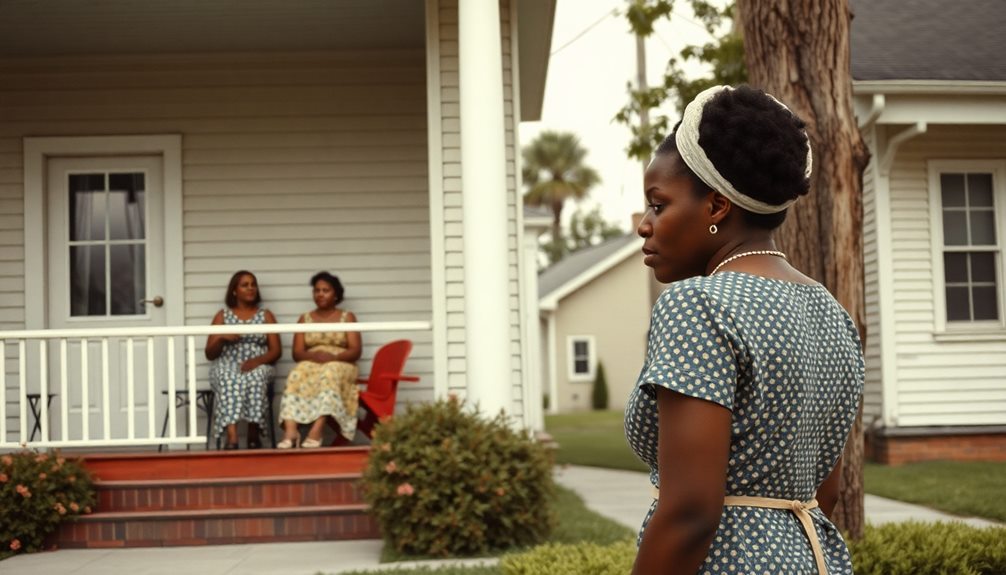In Kathryn Stockett's "The Help," you get a powerful look into life in 1960s Mississippi, focusing on African-American maids and their experiences within a racially charged society. The story centers on characters like Aibileen and Minny, who navigate oppressive environments with resilience and strength. Stockett's narrative raises themes of empowerment and social justice while capturing the complex dynamics between maids and their white employers. You'll witness how friendship and solidarity play essential roles in confronting discrimination. Their journeys reveal deeper truths about race relations, inviting you to reflect on the broader societal implications that still resonate today.
Overview of the Novel
In "The Help," Kathryn Stockett invites you into the deeply complex world of 1960s Mississippi, where the lives of African-American maids intertwine with those of their white employers against the backdrop of the Civil Rights Movement.
You'll meet Aibileen Clark, a wise and nurturing maid who pours her heart into caring for the children of the families she works for. As you read, you'll see her relationship with the children as both a source of strength and a painful reminder of the systemic racism surrounding them. The novel captures the emotional depth of these relationships, highlighting the characters' resilience and struggles, which resonate deeply with readers captivating performances from the cast.
The novel unfolds through the perspectives of Aibileen, Minny Jackson, another resilient maid, and Eugenia "Skeeter" Phelan, a young white woman challenging societal norms. As Skeeter decides to document the maids' experiences, you witness their courage and the bonds they form, despite the oppressive environment.
Stockett's storytelling captivates you, revealing the intimate dynamics between the maids and their employers. Through Aibileen's eyes, you explore themes of empowerment, social justice, and the relentless pursuit of equality, making "The Help" not just a narrative, but a powerful commentary on race relations in America.
Character Insights
In "The Help," you'll see how Minny's resilient spirit shines through her struggles, particularly with her bold personality.
Her journey resonates with the courage and determination to overcome challenges faced by many women.
Aibileen's nurturing influence on the children she cares for reveals the deep emotional bonds that challenge societal norms.
Meanwhile, Skeeter's quest for truth highlights her desire to confront and change the injustices around her, making each character's journey impactful.
Minny's Resilient Spirit
Minny Jackson's resilient spirit shines brightly throughout "The Help," showcasing her remarkable ability to rise above adversity. As an African American woman maneuvering the turbulent waters of the 1960s South, she faces numerous challenges, including unemployment and prejudice.
Yet, Minny stands out not just for her exceptional cooking skills but also for her fiery personality. Her outspoken nature often lands her in trouble, especially with the likes of Miss Hilly, but it's this very defiance that exemplifies her resilience.
When she loses jobs due to discrimination, Minny doesn't succumb to despair. Instead, she finds work with Miss Celia Foote, who values her without judgment. This partnership becomes a turning point, allowing Minny to reclaim her dignity and showcase her talents.
Throughout the narrative, she brings comic relief with her humor and sarcasm, balancing the heavy themes of racism and oppression.
Minny's journey embodies the silent acts of rebellion that many African American women undertake in domestic work. Her story highlights empowerment and the strength to defy an oppressive society, ultimately illustrating that resilience can lead to triumph, even in the darkest times.
Aibileen's Nurturing Influence
Aibileen Clark embodies the nurturing spirit that defines many African American women of her time. As a devoted maid, she cares for her seventeenth white child, Mae Mobley, pouring love and wisdom into her upbringing despite the harsh realities of racial prejudice. Aibileen's ability to instill values of equality and compassion showcases her deep understanding of the importance of nurturing, especially in a world that often denies these principles.
Her personal grief, stemming from the loss of her own son, adds a profound emotional layer to her interactions with the children she cares for. This resilience not only enriches her relationship with Mae Mobley but also highlights the strength of black maids maneuvering a society steeped in racism.
Through Aibileen's eyes, you gain insight into the daily struggles faced by black maids, revealing their contributions and the dignity they maintain despite systemic oppression.
Kathryn Stockett's portrayal of Aibileen, inspired by her own childhood maid, Demetrie, brings authenticity to her nurturing role, allowing you to appreciate the powerful influence of women like Aibileen in shaping the lives of those around them.
Skeeter's Challenging Perspectives
Eugenia "Skeeter" Phelan's journey as a budding writer reflects the struggles of a young woman grappling with the rigid expectations of 1960s Southern society. As a recent Ole Miss graduate, you see Skeeter pushing against traditional gender roles, particularly through her desire to write about the experiences of African American maids, Aibileen and Minny. This endeavor challenges the status quo, as she confronts societal pressures from her peers, especially the domineering Miss Hilly.
Skeeter's growth is evident as she evolves from a naive white woman to a courageous advocate for social change. She learns to navigate complex race and class dynamics, developing a deeper understanding of Aibileen and Minny's lived experiences.
- Skeeter's determination highlights the power of storytelling.
- Her friendships with Aibileen and Minny reveal deep emotional connections.
- The novel showcases the importance of challenging societal norms.
- Skeeter's journey inspires readers to confront their own biases.
Through Skeeter, you witness the transformative impact of empathy and the fight for equality in a divided society. Her character serves as a catalyst for change, encouraging others to question their beliefs.
Racial Dynamics in Mississippi

Steering through the racial dynamics of 1960s Mississippi reveals a society steeped in systemic racism, where African Americans grappled with severe discrimination and limited rights. In this period, approximately 60% of employed African American women worked as domestic workers, primarily as maids for white families. This stark statistic highlights the limited job opportunities available to them due to racial barriers.
Much like the challenges faced by characters in Liesel's resilience, these women navigated complex social hierarchies that hindered their personal and professional growth.
The relationships between African American maids and their white employers were often complex. While some white families formed bonds with their black maids, these connections were frequently overshadowed by the oppressive realities of racism. You see, there was a mix of dependency and affection, but underlying racial tensions constantly reminded both parties of their societal roles.
As the Civil Rights Movement gained momentum, with events like the March on Washington in 1963, the fight against racial inequality intensified. Yet, the struggles faced by African American maids remained deeply entrenched in the fabric of daily life.
Understanding these racial dynamics allows you to appreciate the intricate tapestry of human relationships during this tumultuous time in Mississippi's history.
Themes of Empowerment
In a society marked by deep-seated racial tensions, "The Help" emerges as a powerful narrative of empowerment among African American maids. The characters, especially Aibileen Clark and Minny, navigate their oppressive circumstances while asserting their dignity and worth. Their journeys highlight the strength that comes from friendship and solidarity, demonstrating how they support each other against racial injustice.
Coates' reflections on systemic oppression resonate with the experiences of these characters, emphasizing the need for critical examination of privilege and identity systemic racism in America.
Skeeter's ambition to write a book documenting the experiences of black maids stands as a significant act of empowerment. She challenges societal norms and gives a voice to those often silenced.
Aibileen's nurturing relationship with Mae Mobley further illustrates empowerment, as she instills values of equality and love in the child, promoting a legacy of change for future generations.
Key themes of empowerment in "The Help" include:
- The resilience of African American maids in the face of adversity
- The importance of storytelling as a means of empowerment
- The role of friendship in overcoming societal barriers
- The impact of nurturing relationships on future generations
Through these themes, the novel reflects a broader narrative of personal agency and resistance against a racially divided society.
Critical Responses and Controversies

When you explore the critical responses to "The Help," you'll notice significant concerns about how black characters are portrayed. Many argue that the narrative reinforces harmful stereotypes and reflects a white viewpoint on complex racial dynamics.
This debate raises essential questions about who's the right to tell these stories and the authenticity of representation in literature.
In addition, discussions surrounding unsung contributions in social change emphasize the importance of recognizing diverse voices and perspectives in historical narratives, as pioneers of social change have often faced similar challenges in achieving recognition.
Authenticity of Representation
Critics have raised significant concerns about the authenticity of representation in "The Help," particularly regarding Kathryn Stockett's portrayal of black characters and their experiences in a racially charged 1960s Mississippi. Many argue that the narrative primarily reflects a white perspective, which can undermine the complexities of race relations and the realities faced by marginalized communities.
The criticism centers around several key points:
- Stereotype Reinforcement: Critics claim the book oversimplifies black women's experiences, reinforcing harmful stereotypes.
- Voice and Authority: There's an ongoing debate about who's the right to tell stories about marginalized groups, highlighting the importance of authenticity.
- Complexity of Experience: The portrayal of domestic workers may minimize the violence and abuse they endured during this era.
- Need for Diverse Perspectives: Voices like Melissa McCurdy and Faith Childs advocate for more nuanced, authentic representations of marginalized stories in literature.
These discussions emphasize the necessity of diverse storytelling to guarantee that all voices are heard and accurately represented, enabling a deeper understanding of the past and present struggles faced by marginalized communities.
Stereotype Reinforcement Concerns
Concerns about stereotype reinforcement in "The Help" have sparked intense debates about its portrayal of black maids, leading many to argue that the book simplifies their experiences. Critics point out that the characters often become caricatures, lacking the depth and complexity that truly reflect the lives of black women during the 1960s.
The narrative primarily unfolds from a white perspective, which many believe minimizes the realities of systemic oppression these maids faced daily.
Some readers, especially within the black community, have shared mixed reactions to how these characters are depicted. They argue for more nuanced representations that go beyond surface-level stereotypes.
Scholars also emphasize that the focus on white characters like Skeeter often overshadows the authentic voices of black maids, aligning the story more with white fantasies about race rather than genuine experiences.
This ongoing discussion highlights significant concerns about who gets to tell stories in literature, particularly those involving marginalized groups.
While "The Help" aims to shed light on important issues, it raises critical questions about the ways in which it may inadvertently reinforce stereotypes and limit understanding of the intricate lives of black women.
Authorial Perspective Debate
There's been a significant debate surrounding the authorial perspective in "The Help," particularly regarding how a white author, Kathryn Stockett, navigates the representation of black characters. Critics argue that the narrative mainly reflects a white viewpoint, with Skeeter's story overshadowing the complex realities faced by black maids. This raises vital questions about authenticity and whether a white author can genuinely capture black experiences without reinforcing stereotypes.
Here are some key points to reflect on:
- The portrayal of black characters has been criticized for lacking depth and nuance.
- Many readers express concerns about the authenticity of the dialects used.
- Some black readers have mixed feelings, recognizing the need for diverse perspectives in literature.
- The book has ignited discussions about who's the authority to tell certain stories and the significance of representation.
Ultimately, the debate highlights the importance of including marginalized voices in storytelling. As readers, you should reflect on how representation shapes narratives and advocate for more authentic portrayals that resonate with the true complexities of diverse experiences.
Cultural Impact and Legacy
While many readers have embraced "The Help" for its compelling storytelling and relatable characters, its cultural impact extends far beyond mere entertainment. The novel's massive sales and lengthy tenure on The New York Times Best Seller list underscore its resonance, sparking vital conversations about race relations and representation in literature.
Similar to the way the stories of resilience in "Unbroken" highlight the human spirit's strength, "The Help" prompts you to confront societal biases and question the authenticity of narratives surrounding marginalized voices.
The 2011 film adaptation widened the audience, reinforcing the book's significance in promoting diverse narratives. It also reignited interest in Southern literature, encouraging discussions on women's rights and empowerment during the 1960s.
However, critiques of "The Help" have emerged, calling for more diverse perspectives in storytelling. This dialogue highlights the need for authenticity in representing the experiences of those often sidelined in mainstream narratives.
Ultimately, "The Help" has left a profound legacy, influencing not only literature but also broader societal conversations. It challenges you to think critically about the stories we tell and who gets to tell them, emphasizing the ongoing struggle for equality and representation in both race relations and women's rights.
Conclusion
In "The Help," Kathryn Stockett weaves a tapestry of voices that echo through the corridors of history, reminding you that silence isn't an option for change. As you turn the last page, you can't help but feel the weight of courage pressing against your heart. The characters' journeys illuminate the shadows of oppression, inspiring you to stand tall against injustice. Just like a seed breaking through concrete, their stories bloom, urging you to cultivate empathy and understanding in your own world.



